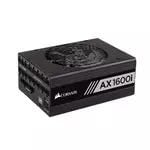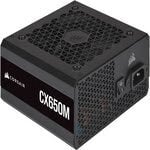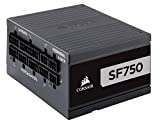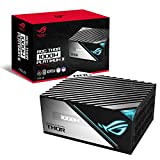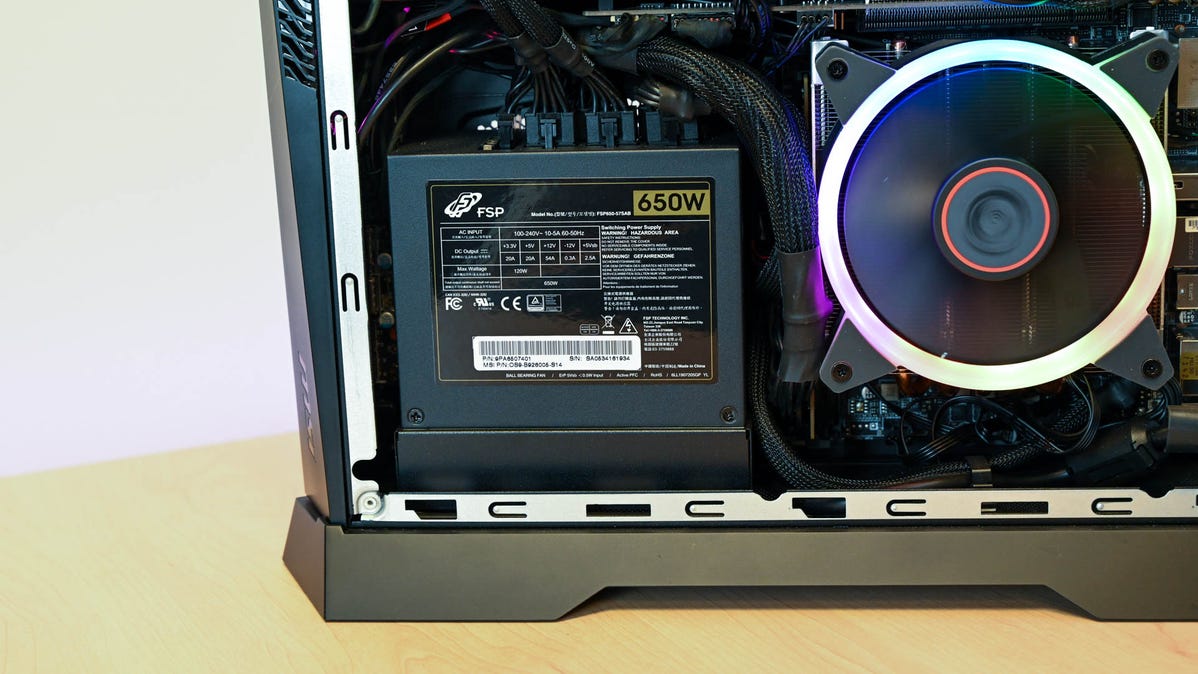
What to Look for in a PSU in 2023
The first thing you should pay attention to is the PSU wattage. You want a unit with enough power for your PC with some to spare in case you decide to upgrade later and keep the power supply silent and not under full load.
The easiest way to calculate your power requirements is by using a PSU calculator. While you should get the same results from, say, the OuterVision Power Supply Calculator and the Cooler Master Power Supply Calculator, it’s always a good idea to check multiple calculators to make sure the wattage matches up. Other PSU calculators include the Newegg Power Supply Calculator, Seasonic Wattage Calculator, and bequiet! PSU calculator.
The general rule of thumb is that 600W or less is enough for office and other builds that don’t include a dedicated graphics card. The 650W-850W range is where most gaming PC builders should look for their PSU of choice. 1000W or more is reserved for high-end gaming PC builds, professional workstations, and miner rigs.
Once you with the power you need, it’s time to decide on the form factor. Most people should look for a classic ATX power supply, but if you’re rocking a small form factor case (SFX, Mini ITX), you’re limited to small form factor (SFX, SFX-L) power supplies.
SFX PSUs are compatible with almost every Mini ITX chassis, while their chunkier cousins, SFX-L units, cannot fit into more compact Mini ITX designs. Whichever form factor you’re after, ensure the PSU fits inside your PC housing before pulling the trigger.
As for the PSU modularity, most mid-range and high-end models are fully modular — every cable can be detached. On the other hand, semi-modular and non-modular designs are reserved for budget and lower mid-range units. We recommend getting a fully modular power supply unless you’re on a budget.
You should also ensure that the PSU you plan to buy has enough 8-pin PCIe power connectors for your graphics card. Don’t worry about this too much since most power supplies packing 500W of power or more that aren’t bottom-of-the-barrel tier come with plenty of 8-pin PCIe connectors—but it’s always good to check nonetheless.
If you’re using a multi-GPU setup for rendering or whatnot, then it’s time to examine the specs. And if you’re eyeing an ATX 3.0-ready PSU, ensure it comes with more than one 12VHPWR connector or has enough 8-pin PCIe power lines to feed all your GPUs.
Next, the 80Plus rating used for the PSU efficiency can be a handy indicator of the overall quality of a power supply; just remember that you shouldn’t equal the 80Plus Gold and higher ratings with high-quality units. Also, a PSU with the 80Plus Bronze rating doesn’t mean it’s a low-quality PSU. It’s a decent point of reference but not a definitive measurement of quality.
While PSUs carrying the 80Plus Platinum or Titanium certificates are usually good buys, you should always read reviews or at least check out where the PSU you’re eyeing ranks on the PSU Tier List. This tier list is one of the best tools for everyone looking for a quality PSU so be sure to use it when in the market for a new power supply.
Concerning warranty, you should avoid models with a manufacturer warranty shorter than five years. Shorter warranties usually hint at lower overall quality. If you’re eyeing a mid-range or high-end PSU, aim for a 7-year manufacturer warranty or better. The best PSUs come with a 10-year warranty period.
Last but not least, the latest ATX12V v3.0 spec requires new PSUs to include one or more 12+4-pin 12VHPWR connectors that can deliver up to 600W of power to the graphics card. All RTX 4000 GPUs from Nvidia use the new connector, and while the current RDNA 3 graphics cards from AMD feature 8-pin power connectors, future AMD cards will most likely switch to the 12VHPWR spec.
In other words, if you’re building a new gaming PC, you should consider getting an ATX12V v3.0 power supply. With that said, there are 12VHPWR adapters you can use that work fine with non-ATX12V v3.0 power supplies.
Best PSU Overall: Corsair AX1600i
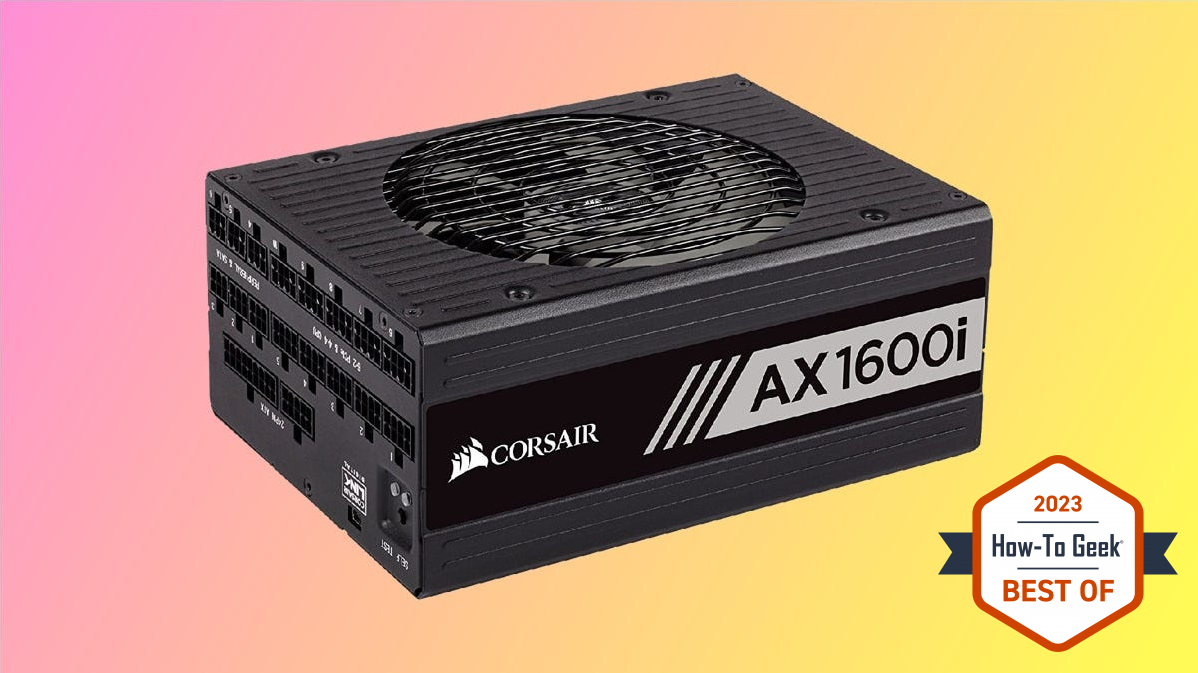
Pros
- ✓ Delivers 1600W of power
- ✓ Extremely efficient
- ✓ Top-notch quality components
- ✓ Uses GaN transistors
- ✓ 10-year warranty
- ✓ Silent operation
- ✓ Fully modular
- ✓ Tons of connectors
Cons
- ✗ Very expensive
- ✗ Bulky
- ✗ No ATX 3.0 support
Corsair released the AX1600i more than five years ago, and since then, no one else has offered a PSU that can match its quality. This power supply is the pinnacle of the PC PSU design and the best consumer-grade one you can get.
It features internal components of the highest quality, ultimate performance, every protection feature available, delivers 1600W of power, has a fully modular design, comes with a 10-year warranty, and is impressively efficient. It even has Gallium Nitride (GaN) transistors, which are generally superior to their silicon cousins. Its only real downside is the high price, but it’s worth every penny if you can swing it.
As for the alternatives, look at the EVGA SuperNOVA 1600 T2. This PSU is almost as good as the AX1600i while costing slightly less. The Corsair HX1500i is another excellent choice, especially if we take into account it’s more than $200 less than the AX1600i. Finally, if you don’t need that much power, our best gaming PSU pick should be right up your alley.
Best PSU Overall
Corsair CX1600i
Powerful, efficient, with unmatched component quality and tons of connectors, the Corsair CX1600i is the best PSU you can get, period.
Best Budget PSU: Corsair CX650M

Pros
- ✓ Excellent performance for the price
- ✓ Lots of power
- ✓ Solid build quality
- ✓ Compact
- ✓ 5-year warranty
Cons
- ✗ Semi-modular design
- ✗ Supplied cables aren’t that great
The CX-M series from Corsair is among the best budget offerings on the market. These aren’t the most affordable power supplies around, but for the price, they offer respectable performance, high-quality components, a 5-year warranty, and higher build quality than other budget models.
The Corsair CX650M has enough power for most budget and mid-range PC builds, but you can also opt for the 750W unit if you’re looking for an affordable PSU to power an upper mid-range gaming PC.
The only smudge here is the semi-modular design, but considering we’re talking about a budget PSU, it’s not a significant negative. The modular cables are also quite thin and unsleeved, but that’s something you’ll also find on virtually every budget PSU.
If you’re looking for something more affordable with a similar level of quality, the Thermaltake Smart BM2 650W offers comparable performance for a lower price. If you want RGB in your PSU, the Corsair CX650F RGB is a sound choice; just be ready to pay the premium for the RGB.
Best Budget PSU
Corsair CX650M
While not the cheapest PSU around, the CX650M offers plenty of power for mid-range gaming PC builds, is well built, and can hold its ground against many pricier options.
Best PSU for Gaming: MSI MEG Ai1000P
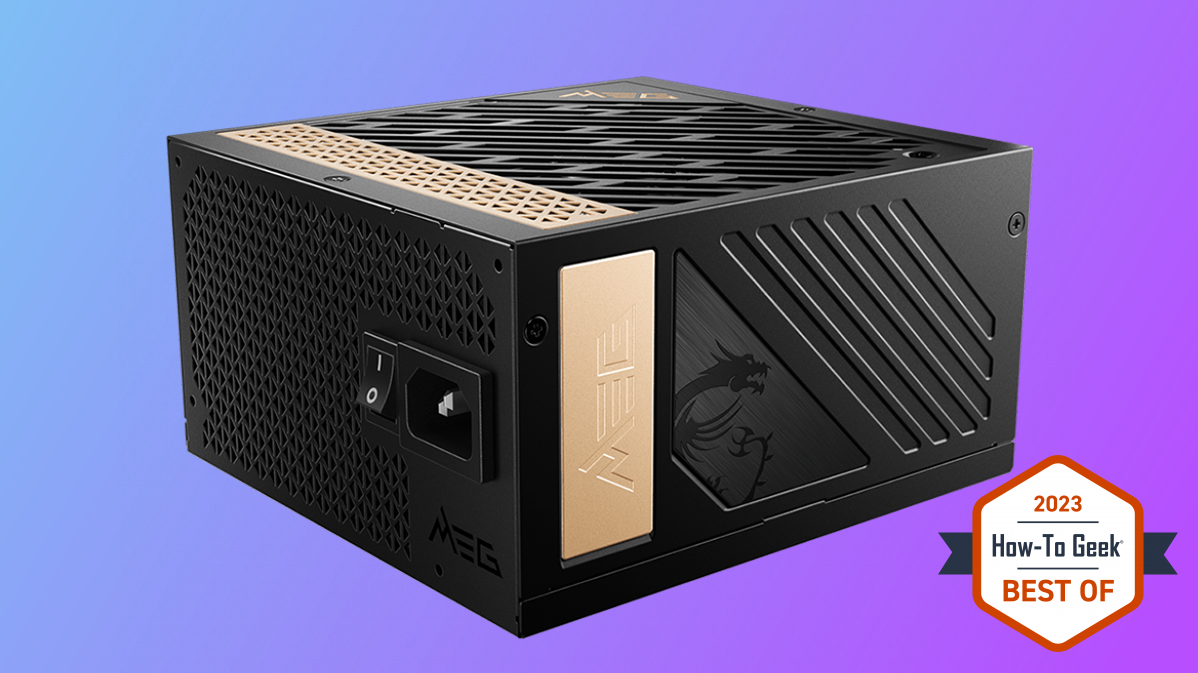
Pros
- ✓ ATX 3.0 ready
- ✓ 1kW of power
- ✓ High build quality
- ✓ Very quiet under light and medium loads
- ✓ Braided cables
- ✓ Features every power connector you might need
- ✓ Fully modular
- ✓ 10-year warranty
Cons
- ✗ Noisy under strenuous loads
- ✗ Expensive
The MSI MEG Ai1000P is a perfect choice for every gamer thanks to its outstanding performance, 1000W of power, full ATX 3.0 support with 12+4-pin power connectors, and low noise output under medium loads.
Another plus is a 10-year warranty and excellent braided cables in the package. This well-rounded PSU will provide enough power even for a power-hungry NVIDIA RTX 4090 and Intel Core i9-13900K processor combo. This is the power supply to get if you’re looking for a high-end gaming PSU.
The MEG Ai1000P costs a pretty penny, and its 1000W power output is overkill for most gaming PC builds. If you want the same power and a bit worse efficiency for noticeably less cash, the Thermaltake Toughpower GF3 1000W is yet another high-quality ATX 3.0-ready PSU.
Even better, you can find the Toughpower GF3 in an 850W flavor if you’re not using a top-of-the-line GPU and CPU. Both the MSI MEG Ai1000P and the Thermaltake Toughpower GF3 can get noticeably noisy at high loads. If you have the cash and aren’t interested in ATX 3.0 support, the EVGA SuperNOVA 1000 G7 is as good a gaming PSU as they come.
Gamers on a budget should check our budget pick. If you’re a gamer looking for the best bang-for-buck option and aren’t interested in ATX 3.0 compatibility, the Enermax Revolution DF 850W is the winner. There’s also a 750W version of the Revolution DF that costs around $120. Finally, you can always count on Corsair’s RMx series, which is probably the most popular mainstream PSU lineup around.
Best PSU for Gaming
MSI MEG Ai1000P
With the MEG Ai1000P MSI made one of the best PSUs on the market and a worthy pick for every high-end PC gaming build. The PSU fully supports ATX 3.0 spec, offers top performance, but also costs a pretty penny.
Best Small (SFX) PSU: Corsair SF750
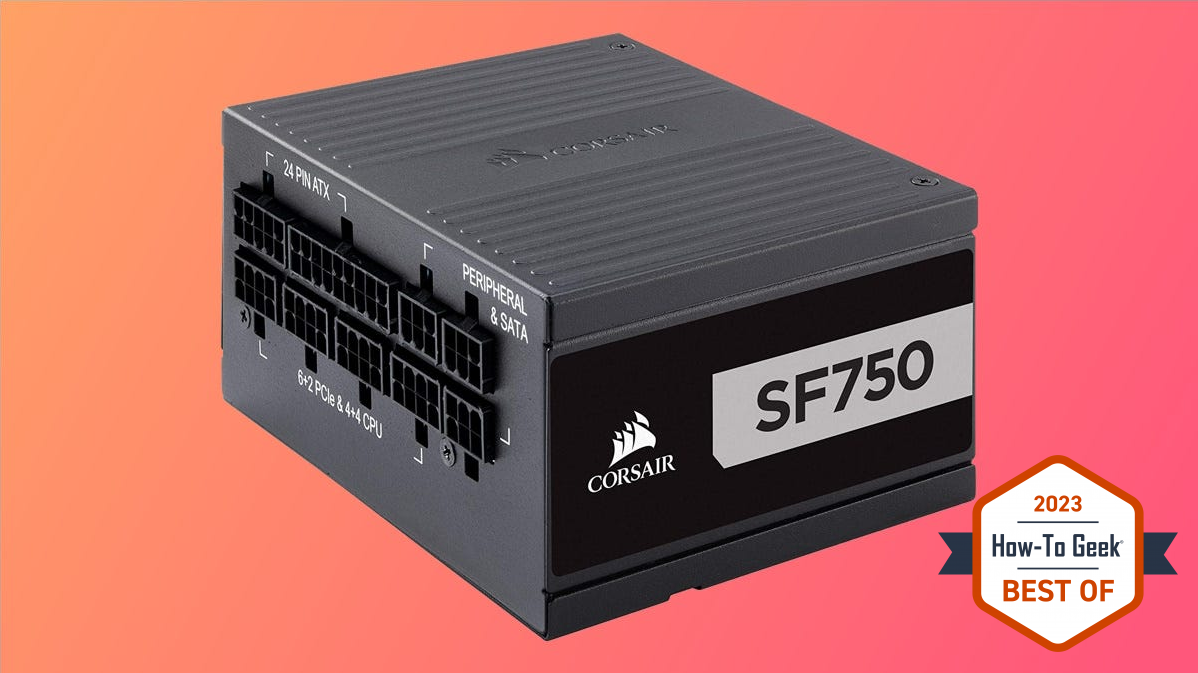
Pros
- ✓ Ultimate performance on the SFX PSU market
- ✓ Superb components
- ✓ Very compact
- ✓ Reasonably silent
- ✓ Efficient
- ✓ 7-year warranty
- ✓ Fully modular
Cons
- ✗ Tops out at only 750W
- ✗ Expensive
The SF750 from Corsair is the gold standard for small form factor PC power supplies, similarly like the AX1600i is the gold standard for high-end PC PSUs.
This model features ultimate performance among SFX power supplies, top-notch components, full modularity, impressive efficiency, and compact design. If you’re building a small form factor PC, the Corsair SF750 is the best choice.
If you want more power, check out the Cooler Master V850 SFX Gold or the FSP Dagger Pro SFX 850W. While both units have good overall performance, they can get noisy under strenuous loads.
To everyone looking for a 1000W SFX PSU, there isn’t any. Your only choices are SFX-L PSUs featuring a slightly longer form factor that won’t fit into many Mini-ITX enclosures. Our recommendation here is the SilverStone SX1000 SFX-L. Finally, if you’re looking for an ATX 3.0-ready SFX PSU, the ASUS ROG Loki SFX-L series is great but also quite expensive.
Best Small (SFX) PSU
Corsair SF750
The gold standard on the SFX PSU market, the Corsair SF750 is hands down the best small form factor power supply you can buy right now.
Best PSU with RGB: ASUS ROG Thor 1000W Platinum II
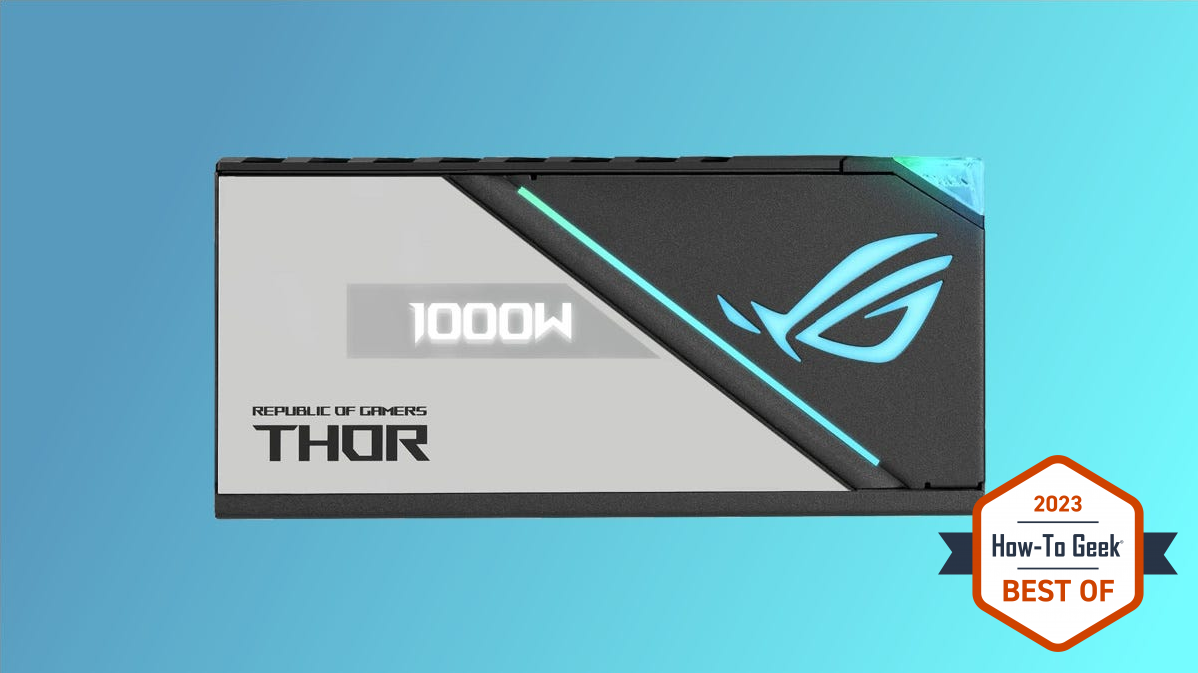
Pros
- ✓ Delivers 1kW of power
- ✓ Slick design
- ✓ Lots of RGB and an OLED screen
- ✓ Excellent performance
- ✓ Quiet operation
- ✓ Fully modular
- ✓ 10-year warranty
Cons
- ✗ Very expensive
- ✗ Some cables aren’t sleeved
The ASUS ROG Thor 1000W Platinum II has it all. Tons of power, superb performance, extraordinarily quiet operation, a 10-year warranty, and a quality build. But this one also comes with a slick design with lots of RGB and an OLED screen to read PSU power draw data from, which can be handy for testing and troubleshooting purposes.
On the flip side, some cables in the selling package are unsleeved, which is far from ideal at this price point. The only thing that could dissuade you from grabbing one of these is the price, which is always extra high for high-end ASUS products.
As we said, the ROG Thor looks slick but is also quite pricey. If you want something more affordable, the Thermaltake Toughpower Grand RGB 850W Platinum is an excellent substitution that boasts smashing performance and is available in 1050W and 1200W flavors. Budget-oriented buyers should check out the Corsair CX750F RGB.
Best PSU with RGB
ASUS ROG Thor 1000W Platinum II
While it’s priced quite high, the ROG Thor 1000W Platinum II from ASUS offers a combination of top-tier performance and bunch of RGB, a winning formula for many PC gamers. If you’re an RGB fan, this is the PSU to get.
Frequently Asked Questions
What is a power supply unit?
A power supply unit is a PC component that transforms the AC from the wall outlet to the DC used by PCs. It delivers electric power to every other PC component and is arguably the most critical part of every PC build.
Are all power supply units universally compatible?
While all PC power supply units use the same connectors — 24-pin for the motherboard, 6 and 8-pin connectors for the CPU and GPU, SATA connectors, etc. — you shouldn’t mix and match removable cables that come with semi-modular and fully modular PSUs.
The power cables are usually specifically designed for a single PSU model, and by using cables taken from another PSU you can damage or destroy the power supply and other components.
Always double-check whether the power cables are compatible with the PSU you want to use them with.
How long do power supply units last?
There isn’t a rule stating how long different PSUs should last. To get a ballpark estimate of its lifespan, check the manufacturer’s warranty period.
High-end PSUs can last for a decade or longer without issues, but you should start considering replacing your power supply for a new one once it reaches the decade mark.
Why is my power supply unit’s fan not spinning?
One possibility, the most likely one, is that your PSU features a semi-passive mode of operation. This means the power supply doesn’t turn its fan on under light and medium loads.
You can check whether your unit comes with the semi-passive mode by reading the documentation that came with it or by visiting your PSU’s manufacturer page.
Another possibility, although much less likely, is that you have an entirely passive unit that doesn’t come with a fan.
The last option is something wrong with your PSU fan or the power supply. Luckily, you can test most PSUs to see whether they work, or you can use a PSU tester.
What wattage should I use for my power supply unit?
The general rule of thumb is that 600W or less is enough for office and other builds that don’t include a dedicated graphics card.
650W-850W is where most gaming PC builders should look for their PSU of choice.
And 1000W or more is reserved for high-end gaming PC builds, professional workstations, and miner rigs.
To get more accurate results, visit one of the power supply calculators we shared above.

